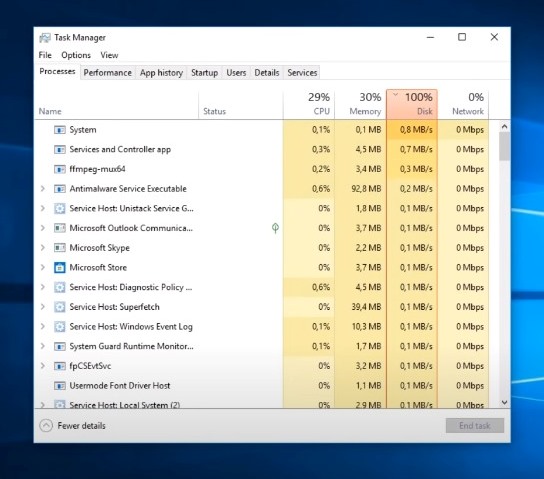Experiencing a scenario where your computer’s CPU usage reaches 100% even when no applications are running can be perplexing and frustrating. Several factors can contribute to this issue, such as background processes, malware, driver problems, or system updates. To address the problem, one should check the Task Manager for resource-hungry processes, run an antivirus scan, update software and drivers, monitor CPU temperature, and consider removing unnecessary applications.
Further details on each potential cause and troubleshooting steps are elaborated below in the article.
Why Is My CPU Usage at 100 With Nothing Running?
Is your computer’s CPU usage consistently maxed out, even when you’re not actively using any applications? Several factors can contribute to this phenomenon. Let’s explore the possible reasons behind your CPU usage being at 100% even when no programs are running.
Insufficient System Resources
Your computer’s CPU handles all the calculations and operations required to run applications. If your system doesn’t have enough resources to perform these tasks efficiently, the CPU may become overwhelmed, resulting in high usage.
Background Processes and Services
While you may not have any visible programs running, numerous background processes and services continue to operate silently. These processes could be responsible for consuming your CPU resources, leading to high usage.
Malware or Virus Infection
Malware or viruses can infiltrate your system without your knowledge and perform malicious activities. Some malware strains are designed to consume a significant amount of CPU resources, which can cause your CPU usage to spike even when idle.
Outdated or Incompatible Drivers
Drivers act as a bridge between your hardware and operating system, enabling them to communicate effectively. Outdated or incompatible drivers can result in abnormal CPU behavior, leading to high usage.
Power Settings
Certain power settings in your computer’s operating system may prioritize performance over power efficiency. If your power settings are configured to maximize performance, your CPU may constantly run at high usage levels, even when idle.
Hardware Issues
Sometimes, hardware-related problems can cause your CPU to operate at full capacity. Issues such as overheating, faulty components, or inadequate cooling can result in high CPU usage.
Buggy or Faulty Software
Software glitches or bugs can lead to abnormal CPU behavior. If you recently installed or updated a program that is causing conflicts or errors, it may result in high CPU usage.
Operating System Issues
In some cases, your operating system may encounter issues that cause the CPU to run at full capacity. These issues can range from corrupted system files to compatibility problems with certain software.
FAQs
Here are some frequently asked questions regarding high CPU usage when no programs are running, along with their concise answers:
How can I check which processes are causing high CPU usage?
You can use the Task Manager (Ctrl + Shift + Esc) on Windows or the Activity Monitor on macOS to identify the processes that are consuming the most CPU resources. Sort the processes by CPU usage to identify the culprits.
How can I reduce CPU usage when no programs are running?
- Update your operating system and drivers to the latest versions.
- Run a full system scan using reliable antivirus software.
- Close unnecessary background processes and applications.
- Adjust your power settings for balanced performance.
- Check for software updates or uninstall any recently installed programs that might be causing conflicts.
- Ensure your computer’s cooling system is functioning properly to prevent overheating.
Is it normal for CPU usage to spike briefly even when idle?
A slight CPU usage spike when the system is idle can be normal, especially if background processes are performing periodic tasks. However, prolonged or consistently high CPU usage when no programs are running indicates an underlying issue.
Can a failing hard drive cause high CPU usage?
While a failing hard drive can contribute to system slowdowns, it is not directly related to CPU usage. However, if your hard drive is encountering read/write errors, it may impact overall system performance.
Conclusion
Experiencing high CPU usage when no programs are running can be frustrating, but it’s crucial not to ignore this issue. By understanding the possible causes and implementing the appropriate solutions discussed in this article, you can effectively diagnose and resolve the problem.
Remember to keep your system updated, perform regular malware scans, and optimize your power settings for balanced performance. With these measures in place, you can ensure smooth and efficient CPU operation for your computer.
